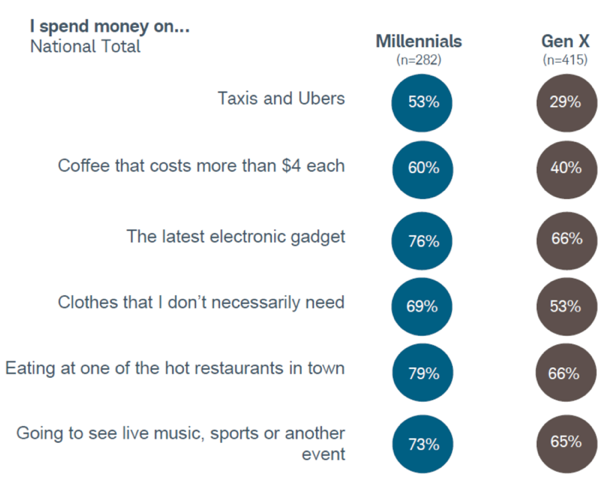Share
Why Millennials Matter?
What You Need to Know.
Who are Millennials?
The largest generation of young people since the ’60s has become a major force in the world. They’re called Millennials because they came of age at the turn of the millennium. The Millennial generation is the largest in US history and as they reach their prime working and spending years, their impact on the economy is going to be huge.
Born between the early 1980s and late 1990s, Millennials are already having a huge impact on entire segments of the economy. And as they age, they will be become the next dominant generation of Americans.
The oldest Millennials are still relatively new to the workplace and the youngest are still in college.
Millennials are Big Spenders
And whether you call them “Generation Y,” “Millennials,” or the“Dumbest Generation,” they already make up over a quarter of the U.S. population, and already spend USD $170 billion a year of their own and their parents’ money.

Source: Charles Schwab, CNBC, 2017
Millennials are a reflection of the sweeping changes in American life over the past 30 years – racial diversity, sexual orientation, different living arrangements and particularly changes related to technology.
Racial Diversity of Millennials
Diversity is one of the key characteristics of Millennials. In comparison, Hippies, Yuppies and Bobos are relatively uniform in race, living arrangements and socio-economic classes.
Millennials are the first generation to seriously question all traditional racial categories. There is more interaction among races at school and socially. The minority teen culture shows incredible influence on white teens’ choices in music, fashion, and language. Two-thirds of this generation are white; one out of 35 are from mixed-race backgrounds.

Photo by Ivan Samkov from Pexels
Living Arrangements of Millennials
One-parent homes are more common today. A significant number of Millennials (27 percent) have only one parent as compared to 12 percent of children in 1975, according to the US Census Bureau.
Sexual Identity of Millennials
Millennials, more than any other preceding generation, are more exposed and tolerant to sexual orientation issues. Hollywood, MTV, pop culture and the like portray being gay as the ‘in thing’. And the Millennials are embracing it. More Millennials are ‘coming out of the closet’ than previous generations and at an earlier age. Thirty years ago ‘homosexuality’ was viewed as a mental illness now it is increasingly being viewed as ‘part of life’. Thirty years ago, the average age of coming out was age 23 while the average is now 16, according to a 2007 study conducted by the College of Human Development.
Gender Roles Reversal
Millennial males are more likely to colour their hair, wear jewellery, use skin cream and visit a Day Spa. Females, on the other hand, are more likely to try their hand at hardware and power tools as they carry out their own ‘do-it-yourself’ jobs around the house.
Unlike prior generations, female children are now urged to have careers and become self-reliant. The notion that marriage is the ultimate goal for a girl has faded away.
As in prior generations, females are slaves to fashion. This also applies to boys. Both genders feel pressure to dress a certain way for acceptance within their peer groups. The short-lived fashion fads constantly challenge this generation’s pocketbooks.

The Technology Gap
Technology is by far the most distinguishing factor that divides the Millennials from other generations, especially the older generations.

Millennials are the first generation to grow up with computers at home. They were born in a 500-channel TV universe. They are multi-taskers with cell phones that have video and music capabilities; online torrent downloads (music, movies, magazines, etc.); and Instant Messaging on the Internet. They are totally plugged-in citizens of a worldwide web community.
American Millennials have an internet usage penetration rate of 99% compared to just 64% for Yuppies and Bobos and 96% for Gen Xers, according to Statista.
Millennials’ affinity for technology is reshaping the retail space. With product information, reviews and price comparisons at their fingertips, Millennials are turning to brands that can offer maximum convenience at the lowest cost.

Kevon Wilson <br>Data Analyst and Digital Specialist <br>Leve Global
Kevon Wilson, is a premier researcher and strategist. He has more than 15 years’ experience in research, digital marketing, and strategic planning in over 15 countries around the world including Palestine, Mozambique, Malawi, Grenada, Montserrat, Dominica, Jamaica, Trinidad and Tobago, the Bahamas, Barbados, Antigua and Barbuda, and others.
He is co-author of many of Leve Global’s research publications such as Big Data – Delivering the Big Picture to Drive Competitiveness, Everything You Need to Know About Internet Marketing, The Top Ten Emerging Markets as well as market publications on the American, British, German, Japanese and Canadian markets.
